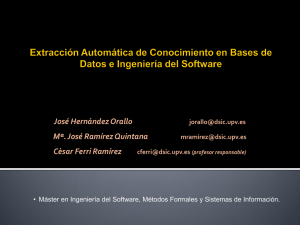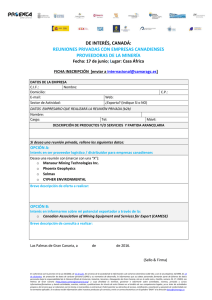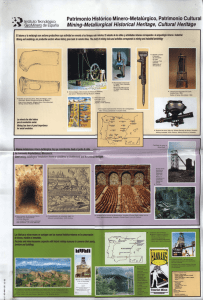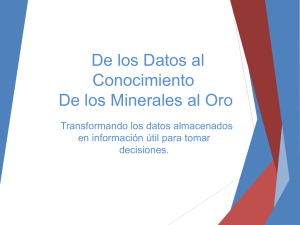Extracción Automática de Conocimiento en Bases de Datos e
Anuncio
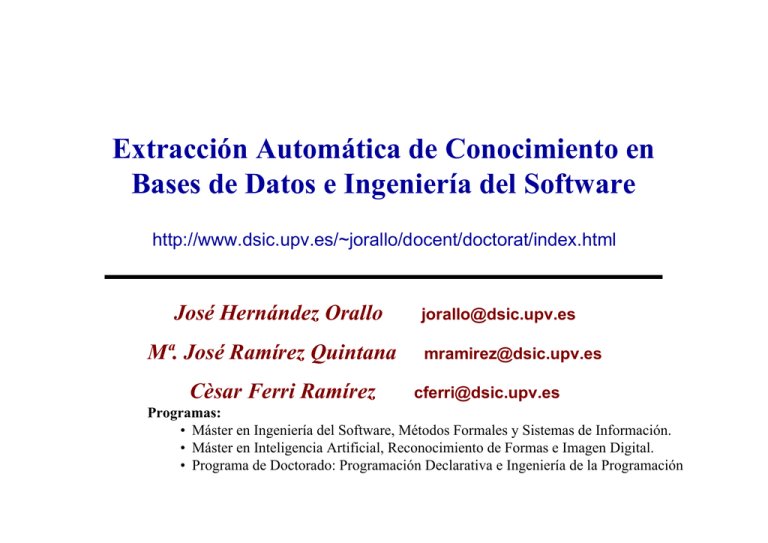
Extracción Automática de Conocimiento en Bases de Datos e Ingeniería del Software http://www.dsic.upv.es/~jorallo/docent/doctorat/index.html José Hernández Orallo Mª. José Ramírez Quintana Cèsar Ferri Ramírez jorallo@dsic.upv.es mramirez@dsic.upv.es cferri@dsic.upv.es Programas: • Máster en Ingeniería del Software, Métodos Formales y Sistemas de Información. • Máster en Inteligencia Artificial, Reconocimiento de Formas e Imagen Digital. • Programa de Doctorado: Programación Declarativa e Ingeniería de la Programación Objetivos (1/2) • Presentar el problema del análisis inteligente y automático de la información para el descubrimiento de conocimiento útil. • Presentar las técnicas de aprendizaje automático más habituales y conocer la idoneidad de cada una para diferentes problemas. • Reconocer la existencia de técnicas inductivas de alto nivel, especialmente las declarativas, que permiten obtener modelos complejos (relacionales y/o recursivos) pero comprensibles, a partir de los datos y de conocimiento previo. 2 Objetivos (2/2) • Particularizar las técnicas vistas para las necesidades específicas de la extracción de conocimiento en bases de datos (KDD), y, en concreto, para la minería de datos (data-mining). • Adaptar la extracción automática de conocimiento a otras fuentes de información no estructurada (textos y web) y semiestructurada (XML). • Conocer las posibilidades de desarrollo semi-automático, combinando técnicas inductivas y deductivas, de sistemas software para el tratamiento de la información. 3 Temario (1/4) 1. Introducción. 1.1. El Problema de la Extracción Automática de Conocimiento. 1.2. Técnicas de Aprendizaje Automático. 1.3. Evaluación de Hipótesis 1.4. Inducción Declarativa y Árboles de Decisión 4 Temario (2/4) 2. Minería de Datos y Extracción de Conocimiento de Bases de Datos 2.1. Nuevas Necesidades de Análisis de Grandes Sistemas de Datos. Los Data-Warehouse. 2.2. El Proceso de Extracción de Conocimiento de Bases de Datos. 2.3. Métodos Específicos de Minería de Datos. 2.4. Técnicas Declarativas para Prospección de Datos. 2.5. Bases de Datos y Lenguajes de Consulta Inductivos. 5 Temario (3/4) 3. Extracción de Conocimiento a Partir de Información No Estructurada 3.1. Los Problemas de la Información No Estructurada. 3.2. Extracción de Conocimiento a partir de Documentos HTML y texto. 3.3. Extracción de Información semi-estructurada (XML). 3.4. Asistentes Web Inteligentes. 3.5. Personalización 6 Temario (4/4) 4. Programación Inductiva e Ingeniería del Software 4.1. La Inducción en la Generación de Software. 4.2. Aplicaciones del Aprendizaje Automático para el Desarrollo de Software. 4.3. Inducción Automática de Requerimientos. 4.4. Modelado (Semi-)Automático. 4.5. Aplicaciones a Otras Fases del Ciclo de Vida. 7 Bibliografía (1/9) APRENDIZAJE AUTOMÁTICO (Generales): • Bishop, Christopher M. “Neural networks and machine learning” Springer, 1998. [4-63/834B, 4-63/835B, D-SIC/2873D, D-SIC/2895D]. • Laird, P.D. “Learning from good and bad data” Kluwer Academic, 1988. [4-63/87B][4-63/88B][4-63/27F][4-63/28F] • Langley, P. “Elements of Machine Learning”. San Francisco: Morgan Kaufmann Publishers Inc, 1996. • Michie, D.; Spiegelhalter, D.; Taylor, C. (eds.) “Machine Learning, Neural and Statistical Classification” Ellis Horwood, 1994. • Mitchell, T.M. “Machine Learning” McGraw-Hill 1997. [4-63/102B, 4-63/34F, 4-63/35F] [*] • Osherson, D.N.; Stob, M.; Weinstein, S. “ Systems that learn : An introduction to learning theory for cognitive and computer scientists”, Cambridge, Bradford, 1990. [4-63/95B] [4-63/96B] [4-63/9F] • Thornton, Chris “Truth from Trash. How Learning Makes Sense” The MIT Press (A Bradford Book), 2000. [4-63/897B] [*] 8 Bibliografía (2/9) APRENDIZAJE AUTOMÁTICO (Específicos): • Fogel, D.B. “Evolutionary Computation. Toward a New Philosophy of Machine Intelligence”, IEEE Press, 1995. [*] • Glenberg, Arthur M.; Haines, B. “Learning from data : An introduction to statistical reasoning”, Mahwah : Lawrence Erlbaum, 1996. - XV, [DSIC/2373D] 2nd ed. [D-SIC/2419]. • Koza, J.R. “Genetic Programming (I and II)” Cambridge, MA, MIT Press, 1992 and 1994. • Mitchell, M. “An Introduction to Genetic Algorithms” Cambridge, MA, MIT Press, 1996. • Quinlan, J.R. “C4.5, Programs for Machine Learning” Morgan Kaufmann, San Mateo, 1993. [4-63/793B] [*] • Sutton, Richard S.; Barto, A.G. “Reinforcement learning : an introduction” Cambridge ; London : Bradford, 1998. [D-ISA/589D, DSIC/3014D] 9 Bibliografía (3/9) APRENDIZAJE DECLARATIVO (ILP, IFLP, …): • Bratko, I.; Muggleton, S. “Applications of Inductive Logic Programming” Comm. ACM, Vol. 35, No. 11., 1995. [*] • Dzeroski, S.; Lavrac, N. “Relational Data Mining” Springer 2001. [DSIC/3347] [*] • Muggleton, S. (ed) “Inductive Logic Programming” Academic Press, 1992. [*] • Muggleton, S.; De Raedt, L. “Inductive Logic Programming: Theory and Methods” J. Logic Prog., 629-679, 1994. [*] • Niehuys-Cheng, S.H.; de Wolf, R. “Foundations of Inductive Logic Programming” Springer, LNAI 1228, 1997. [*] • ILP Workshops (1989 – 2004) [*]) • Journal of Logic Programming, Special Issue: ILP, Vol. 40, nº2/3, 1999. • 1st ICML Workshop on Inductive Programming, 2005. 10 Bibliografía (4/9) DATA-MINING Y KDD: • Adamo, J.M. “Data Mining for Association Rules and Sequential Patterns” Springer 2000. [D-SIC/3243] [*] • Berry M.J.A.; Linoff, G.S. “Mastering Data Mining” Wiley 2000. [168/1891B] [*] • Berthold, M.; Hand, D.J. (ed) “Intelligent Data Analysis. An Introduction” Springer 1999. (2nd Edition 2002). [D-SIC/3346] [*] • De Raedt, L.; Dehaspe, L. “Clausal Discovery” Machine Learning, 26, 99-146, 1997. [*] • Dunham, M.H. “Data Mining. Introductory and Advanced Topics” Prentice Hall, 2003. [DSIC/3475D][*] • Fayyad, U.M.; Piatetskiy-Shapiro, G.; Smith, P.; Ramasasmy, U. “Advances in Knowledge Discovery and Data Mining”, AAAI Press / MIT Press, 1996. [D-SIC/2667] [*] 11 Bibliografía (5/9) DATA-MINING Y KDD: • Fayyad, U.M.; Grinstein, G.; Wierse, A. “Information Visualization in Data Mining and Knowledge Discovery” Morgan Kaufmann, Harcourt Intl., 2001. [D-SIC/3313] [*] • Freitas, Alex A. “Data Mining and Knowledge Discovery with Evolutionary Algorithms”, Springer, Natural Computing Series, 2002. • Han, J.; Kamber, M. “Data Mining: Concepts and Techniques” Morgan Kaufmann, 2001. [D-SIC/3274] [*] • Hand, D.J.; Mannila, H. and Smyth, P. “Principles of Data Mining”, The MIT Press, 2000. [D-SIC/3349] [*] • Hernández, J.; Ramírez, M.J.; Ferri, C. “Introducción a la Minería de Datos”, Prentice Hall / Addison Wesley, 2004. [*] • Pyle, D. “Data Preparation for Data Mining” Morgan Kaufmann, Harcourt Intl., 1999. [D-SIC/3283] [*] 12 Bibliografía (6/9) DATA-MINING Y KDD: • Thuraisingham, B. “Data Mining. Technologies, Techniques, Tools, and Trends”, CRC Press, 1999. [D-SIC/3339] [*] • Witten, I.H.; Frank, E. “Tools for Data Mining”, Morgan Kaufmann, 1999. [D-SIC/3281] [*] • Wong, P. C. “Visual Data Mining”, Special Issue of IEEE Computer Graphics and Applications , Sep/ Oct 1999, pp. 20- 46. [*] • Zhang, C.; Zhang, S. “Association Rule Mining” Lecture Notes in Artificial Intelligence vol. 2307, Tutorial, Springer Verlag 2002. [DSIC/3546] [*] 13 Bibliografía (7/9) XML, Datos Semiestructurados, Web Mining • Abiteboul, S.; Buneman, P.; Suciu, D. “Data on the Web: from Relations to Semistructured Data and XML” Morgan Kaufmann, 1999. [*] • Etzioni, O. “The World- Wide Web. Quagmire or Gold Mine” Communications of the ACM, November 1996, Vol. 39, nº 11, 1996. [*] • Communications of the ACM “Special Issue on Personalization” August 2000, Vol. 43, No. 8. [*] • Kosala, R.; Blockeel, H. “Web Mining Research: A Survey” ACM SIGKDD Explorations, Newsletter of the ACM Special Interest Group on Knowledge Discovery and Data Mining, June 2000, Vol. 2, nº1, pp. 1-15. [D-SIC/ ] [*] 14 Bibliografía (8/9) XML, Datos Semiestructurados, Web Mining • Liu, B.; Chang, C.C. “Special Issue on Web Content Mining” ACM SIGKDD Explorations, Newsletter of the ACM Special Interest Group on Knowledge Discovery and Data Mining, December 2004, Vol. 6, nº1, [*] • Mena, Jesus “Data Mining Your Website”, Digital Press, July 1999. [DSIC/3271] [*] • Chakrabarti, S. “Mining the Web: Discovering Knowledge from Hypertext Data” Morgan-Kaufmann 2003.[D-SIC/3530] [*] 15 Bibliografía (9/9) PROGRAMACIÓN INDUCTIVA E INGENIERÍA DEL SOFTWARE: • Bergadano, F.; Gunetti, D. “Inductive Logic Programming. From Machine Learning to Software Engineering” The MIT Press 1995. [464/5344B, D-SIC/2730D, 4-64/241F] [*] • Hernández, J.; Ramírez, M.J. “Predictive Software” J. of Automated Software, Kluwer Academic Publishers, Dordrecht, vol. 8, nº2, 2001. [*] • Partridge, D. “The Case for Inductive Programming” IEEE Computer, January 1997, 36-41. [*] • Lieberman, Henry “Your Wish is My Command: Programming By Example” Morgan Kaufmann, [D-SIC/3248] [*]. • Zhang, Du.; Tsia, Jeffrey J. P. (eds.) “Machine Learning Applications in Software Engineering”, World Scientific, 2005. 16
